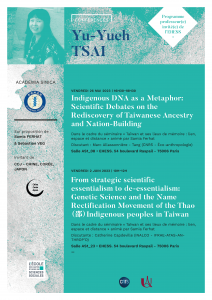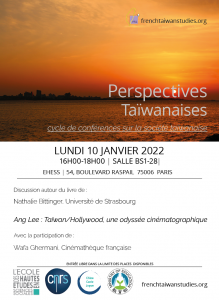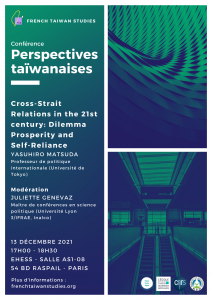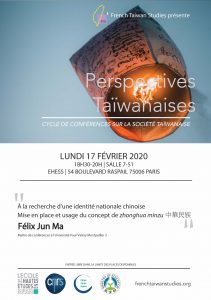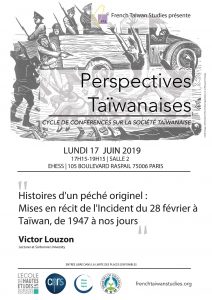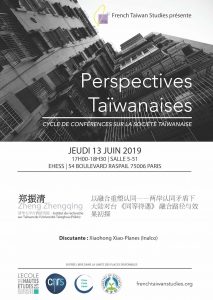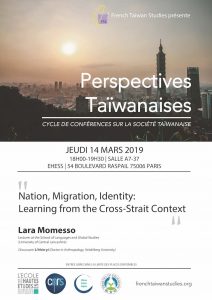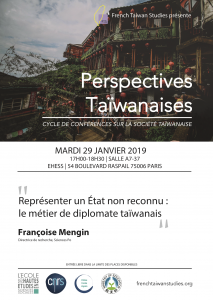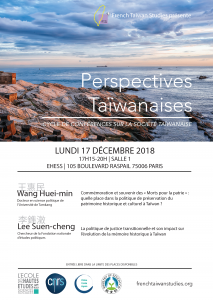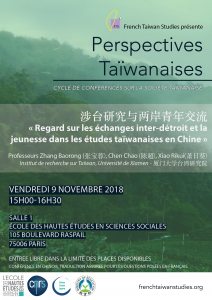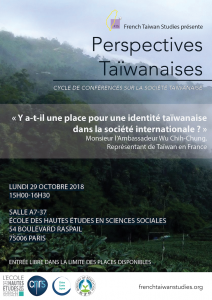Perspectives taïwanaises
Perspectives taïwanaises est un cycle de conférences portant sur la société taïwanaise. Au travers des interventions de chercheurs et acteurs des études taïwanaises, le cycle a pour but de donner un éclairage sur les enjeux modernes et contemporains taïwanais.
Ce cycle, élaboré en parallèle du séminaire Taïwan et ses lieux de mémoire, est ouvert à toutes les personnes désireuses d’approfondir leurs connaissances de la société taïwanaise dans toute sa richesse.
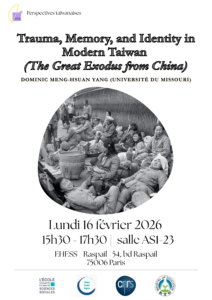
Trauma, Memory, and Identity in Modern Taiwan (The Great Exodus from China)
Lundi 16 février 2026
15h30, Salle AS1-23, 54 Bd Raspail - 75006
Dominic Meng-Hsuan Yang (Université du Missouri)
One million mainland Chinese were forcibly displaced to Taiwan during and following the Nationalist collapse and the Chinese Communist victory in 1949 on the onset of the Cold War in Asia. This was the origin of the Taiwan Strait issue as we know it today. Hundreds of books and articles have been produced on the Taiwan Strait from the perspectives of geopolitics, diplomacy, trade, economic growth, technological development, and military history. Very little has been written on the actual human beings who were uprooted and traumatized in the process. Not everyone who ended up in Taiwan was a diehard Chiang Kai-shek supporter. The mainlanders also did not move to “a Chinese island.” They were both war refugees and overbearing colonizers to the Japanized local Taiwanese population. In this talk, I will first take the audience through the main empirical findings and theoretical arguments in my 2020 book The Great Exodus from China: Trauma, Memory, and Identity in Modern Taiwan. I will then reflect on the content of the book against the most recent archival evidence and research in Taiwan. Finally, I will assess how Taiwan’s contemporary memory politics and evolving identity influence its relationships with China, Japan, and the United States.
Présentation de l’intervenant :
Dominic Meng-Hsuan Yang est professeur associé au département d’histoire de l’Université du Missouri à Columbia (États-Unis). Ses recherches antérieures ont principalement porté sur l’exode lié à la guerre civile chinoise vers Taïwan (ainsi que vers Hong Kong). De ces travaux est issu l’ouvrage The Great Exodus from China: Trauma, Memory, and Identity in Modern Taiwan, qui a reçu le First Book Award de la Memory Studies Association pour l’année 2020-2021. Les travaux de Dominic Meng-Hsuan Yang ont également été publiés dans des ouvrages collectifs et des revues académiques telles que China Perspectives, Taiwan Historical Research, Journal of Chinese Overseas, Journal of Chinese History et The Historical Journal (Cambridge). Ses recherches les plus récentes s’articulent autour de trois axes principaux : (1) les paysages mémoriels et les processus de justice transitionnelle transnationale dans le Taïwan démocratisé ; (2) les réfugiés de guerre issus de la première crise du détroit de Taïwan ; (3) la Terreur blanche au sein de l’armée de Chiang Kai-shek.
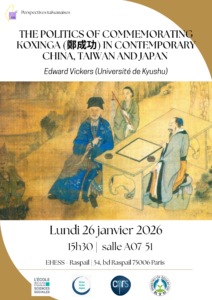
Whose national hero?
The politics of commemorating Koxinga (鄭成功) in contemporary China, Taiwan and Japan
Lundi 26 janvier 2026
15h30, Salle A07-51, 54 Bd Raspail - 75006
Edward Vickers (Université de Kyushu)
Koxinga, a half-Japanese, half-Chinese buccaneering general of the mid-17th century, achieved fame as a leader of Ming loyalist resistance to the Manchu invasion of China. Following the triumph of the Manchu Qing dynasty, he moved his forces to Taiwan, where they defeated and expelled the Dutch colonial regime. His family then ruled the island as an independent fiefdom for 20 years until the Qing invaded and incorporated it within their empire. Koxinga has enjoyed a long and varied posthumous career as a deified ancestor figure for Han colonists in Taiwan, a symbol during the colonial period of the island’s intimate ties to Japan, and a totem of Chinese anti-imperialist nationalism. This chapter analyses how his heroic reputation has been reinterpreted or reimagined in contemporary Taiwan, mainland China and Japan, focusing especially on his portrayal in museums and public memorials. It argues that political and ideological changes in Taiwan and China have been reflected in major shifts in emphasis in Koxinga’s portrayal. Almost universally viewed as a symbol of indissoluble ‘Chinese’ unity in the 1970s, today interpretations of his significance have diverged. While on the mainland Koxinga still symbolises monolithic ethno-cultural unity of all Chinese people, on Taiwan he has come to symbolise a multicultural Taiwan distinct from China.
Présentation de l’intervenant :
Edward Vickers est titulaire de la Chaire UNESCO « Éducation pour la paix, la justice sociale et la citoyenneté mondiale » à l’Université de Kyushu (Japon). Il a également été président de la Comparative Education Society of Asia. Ses recherches portent sur l’histoire et la politique de l’éducation en Asie contemporaine, en particulier au sein des sociétés chinoises (République populaire de Chine, Hong Kong et Taïwan). Il s’intéresse par ailleurs aux enjeux politiques du patrimoine lié aux conflits en Asie et mène actuellement, en collaboration avec Mark Frost (University College London) et d’autres chercheurs, un projet consacré à l’histoire publique, à l’éducation et aux processus de réconciliation au Sri Lanka à la suite de la guerre civile. Parmi ses ouvrages figurent Education and Society in Post-Mao China (2017, avec Zeng Xiaodong), Constructing Modern Asian Citizenship (2015, avec Krishna Kumar) et Remembering Asia’s World War Two (2019, avec Mark Frost et Daniel Schumacher). Le professeur Vickers a également contribué à la direction de projets majeurs pour l’Institut Mahatma Gandhi de l’UNESCO à New Delhi et a coécrit le rapport de l’UNESCO publié en 2017, Rethinking Schooling for the 21st Century: The State of Education for Peace, Sustainable Development and Global Citizenship in Asia.

Rencontre avec Alexandre Gandil autour de son ouvrage Kinmen, un archipel entre Taiwan et la Chine
Intervenant : Alexandre Gandil (ATER à l’Université Bordeaux Montaigne, CERI, AFET)
Pour cette séance, Alexandre Gandil proposera une lecture des principaux enjeux géopolitiques et symboliques liés à l’archipel de Kinmen, territoire taïwanais situé aux portes de la Chine continentale. Héritage de la guerre civile chinoise, longtemps militarisé puis oublié, Kinmen est aujourd’hui au cœur de nouvelles projections stratégiques. Cette conférence propose de repenser la question sino-taïwanaise à partir de cette frontière singulière, et d’interroger les liens entre territoire, État et nation dans le monde sinophone.
Résumé du livre :
C’est le reliquat de la guerre civile chinoise (1946-1950) et de la Guerre froide. À quelques kilomètres seulement des côtes de la République populaire de Chine, aux portes de la province continentale du Fujian, le drapeau de la République de Chine (Taiwan) flotte encore sur le petit archipel de Kinmen (Quemoy).
Lors de sa débâcle vers Taipei, en 1949, Chiang Kai-shek était en effet parvenu à maintenir les troupes de l’armée nationaliste sur ce bouquet d’îles côtières, de l’autre côté du détroit de Formose par rapport à l’île de Taiwan, au risque de faire basculer le monde par deux fois dans une guerre nucléaire pendant les années 1950. Réceptacle fugace de l’attention internationale, l’archipel de Kinmen – pas plus grand que le Liechtenstein, et peuplé de quelques dizaines de milliers d’habitants – est toutefois rapidement tombé dans l’oubli. Jusqu’à ce que l’invasion russe de l’Ukraine, en 2022, n’en fasse, par transposition souvent maladroite, un objet de curiosité et de craintes.
Or, par-delà le prisme de l’affrontement militaire passé ou à venir, Kinmen invite avant tout à décentrer le regard porté sur la Chine et sur Taiwan. Entre les deux rives du détroit de Formose, au-delà de la fameuse ligne médiane, ce petit archipel arraché au continent au milieu du XXe siècle met depuis au défi l’histoire, le politique et la géographie en matière d’édification stato-nationale dans le monde sinophone – et ce, non sans enseignements à tirer à l’échelle globale.
La lecture de cet ouvrage s’impose à qui veut comprendre la question sino-taiwanaise et la menace qu’elle fait peser sur la paix mondiale, en ces temps dangereux. Et aussi à qui veut reprendre à nouveaux frais le rapport de l’État à la nation, dans une perspective comparative.

Journées Jeunes Chercheurs en études taïwanaises 2025 青年學者臺灣研究研討會
Taiwan Studies Project – EHESS et l’Association Francophone d’Études Taïwanaises (AFET) organisent, les 24 et 25 avril 2025 à l’EHESS, la treizième édition des Journées jeunes chercheurs en études taïwanaises
Activité phare de l’AFET, ces journées sont devenues, au fil du temps, une étape importante dans la carrière des jeunes chercheurs et dans la dynamique des études taïwanaises en France. Leur objectif est de convier de jeunes chercheurs de toutes nationalités confondues – étudiants de licence, master, doctorants et jeunes docteurs – à présenter leurs travaux devant une assistance composée de pairs, d’enseignants-chercheurs et chercheurs confirmés, tous spécialistes de Taïwan et appartenant aux différentes disciplines relevant des sciences humaines et sociales.
Pour cette édition, douze jeunes chercheurs viendront présenter leurs travaux. Chaque intervention sera suivie d’un commentaire par un chercheur confirmé, puis d’un temps d’échange avec le public, afin d’encourager le dialogue et la réflexion collective.
Ces Journées offrent ainsi un espace d’échange privilégié autour des expériences de terrain, des problématiques de recherche et des méthodologies, dans une atmosphère bienveillante et stimulante.
Elles seront également l’occasion de remettre le huitième Prix Christian Ricourt du jeune chercheur francophone en études taïwanaises, destiné à encourager la recherche et la conduite de travaux de terrain.
Pour plus d’informations : https://frenchtaiwanstudies.org/journees-jeunes-chercheurs-en-etudes-taiwanaises-2025/
China’s Taiwan Policy in the 21st Century: What is the “Peaceful Unification” Policy?
YASUHIRO MATSUDA, Professeur de politique internationale (Université de Tokyo)
The question, “Will China invade Taiwan?” is frequently raised. While China continues to advocate for its “peaceful unification” policy, it simultaneously strengthens its nuclear capabilities to deter U.S. intervention and bolsters its conventional military forces in preparation for a potential occupation of Taiwan. Furthermore, the “peaceful unification” policy has historically encompassed the potential use of force.
What underpins China’s policy toward Taiwan? By thoroughly analyzing China’s approach, we can gain insights into the future trajectory of relations between mainland China and Taiwan.
Rencontre avec Beatrice Zani autour de son livre Women Migrants in Southern China and in Taiwan. Mobilities, digital economies and emotions (Routledge, 2022).
Beatrice Zani
Chargée de recherche au CNRS (LISE UMR 3320)
This book, based on extensive original research, explores the lives, the migratory experiences and the social, economic, and emotional practices of Chinese migrant women during their migrations and mobilities in China, from China to Taiwan, from Taiwan to China and in between the two countries. It illustrates how women on the move experience social contempt, misrecognition and economic marginalisation; how women migrants seek autonomy, economic independence, upward social mobility and modernity, but discover the Chinese inegalitarian social order and labour regimes which produce obstacles and impede their ambitions; and how old and new forms of subalternity are reproduced. Overall, the book emphasises what it feels like for the women migrants as they negotiate their way at the crossroad between subalternity and resistance, between subordinated labour and independent, digital entrepreneurship, and between an inegalitarian labour market and new, online opportunities for business and commerce.
Séances complémentaires avec Tsai Yu-yueh (26 mai et 2 juin 2023)
Dans le cadre des Perspectives taïwanaises, Tsai Yu-yueh (Academia Sinica) proposera deux séances complémentaires s’inscrivant dans le séminaire « Taïwan et ses lieux de mémoire : lien, espace et distance ».
26 mai :
我會建議附檔我初稿的題目Indigenous DNA as a Metaphor: Scientific Debates on the Rediscovery of Taiwanese Ancestry and Nation-Building
附檔的初稿你先別外傳,但這個研究很有趣,有新的資料,包括台灣祖先爭議如何寫入新的歷史教科書,比較完整也有份量。
Abstract
The development of genealogical science in the twenty-first century has important implications for national and racial/ethnic construction. In Taiwan, genetic research on the origins of Taiwanese has involved racial/ethnic issues but also the dispute over Taiwan’s national identity with the People’s Republic of China, which claims that “we have the same roots” or “blood is thicker than water.” After the end of martial law (1945-1987), scientific research on multi-origins and genetic makeup of Taiwanese emerged. In particular, Marie Lin,M.D., widely known as “the mother of the research on Taiwanese blood,” and her teams have been devoted to revealing the origins of the ethnic groups in Taiwan. My research pushes the concept of co-production between science and politics (Jasanoff, 2004) further by addressing the “nationalization of biomedicine” and the “biomedicalization of the nation”. I explore how the Taiwan’s changing identity politics, including the emergence of the new categorization of four great ethnic groups, multiculturalism, and Taiwanese nationalism, has profoundly influenced genetic research on Taiwanese genealogy and how scientific findings produced in the lab have then spilled out into both Taiwan and the PRC through journals, media, history textbooks, and public disputes since the 1990s. For genealogical science to play a constructive role in identity-making, this research shows that we need to remain vigilant to genetic technology, scientific knowledge formation, and methodology by looking at scientists’ works and discourses through an STS perspective to extend the epistemological reflection.
2 juin :
From strategic scientific essentialism to de-essentialism: Genetic Science and the Name Rectification Movement of the Thao(邵) Indigenous peoples in Taiwan
Abstract
Using the name rectification movement of the Thao people in Taiwan as an example, this article analyzes how name rectification activists used human genome research to achieve their re-naming goal. I use historical and field data to argue that Thao ethnic activists used DNA evidence as an example of “strategic scientific essentialism” in Thao identity formation. After the Thao was officially recognized by the Taiwan government in 2001, DNA evidence was deemphasized compared to land ownership, the establishment of a Thao national council, and the promotion of Thao language learning in the construction of Thao ethnicity. This shift from “strategic scientific essentialism” to “strategic scientific de-essentialism” confirms that ethnic identity is not primordial, but a product shaped by social and political change. The Thao’s successful re-naming campaign demonstrates how genetic knowledge can generate significant social effects on resource access and power redistribution by shaping ethnic identity and differences.
Le lien à la terre natale : trois générations de Waishengren (外省人) à Taïwan
Conférence de Fu Si-tai (傅思台) (Docteur en sociologie, EHESS)
Lundi 5 décembre 2022
Fu Si-tai présentera le contenu d’un travail de terrain mené auprès de trois générations de Waishengren à Taïwan de 2017 à 2018. Il privilégiera la question du lien à la terre natale tout en interrogeant les dynamiques d’identification, ainsi que les attaches nourries à l’égard d’espaces possiblement perçus comme terre d’origine et/ou terre d’accueil.
Discutante : Évelyne Ribert (CNRS – IIAC/LACI)
Ang Lee : Taïwan/Hollywood, une odyssée cinématographique
Lundi 10 janvier 2022
16h, Salle BS1-28, EHESS, 54 Bd Raspail - 75006 Paris
Intervenante :
Nathalie Bittinger – Maître de conférences en études cinématographiques à l’Université de Strasbourg et membre du laboratoire Approches contemporaines de la création et de la réflexion artistiques
Discutante :
Wafa Ghermani – Docteure en études cinématographiques, Service de la valorisation des collections films de la Cinémathèque française
Cette séance des Perspectives taïwanaises vous invite à découvrir le dernier ouvrage de Nathalie Bittinger, Ang Lee : Taïwan/Hollywood, une odyssée cinématographique (Éditions Maisonneuve & Larose). Ce premier ouvrage en langue française consacré au cinéma d’Ang Lee revient à la fois sur les conditions de production, les thèmes-phares et les singularités stylistiques des quatorze opus du cinéaste multi-oscarisé, à cheval entre le cinéma mainstream et le film d’auteur.
Cross-Strait Relations in the 21st Century: Dilemma Prosperity and Self-Reliance
Lundi 13 décembre 2021
17h00-18h30, Salle AS1-08, EHESS, 54 Bd Raspail - 75006 Paris
Intervenant :
Yasuhiro Matsuda – Professeur de politique internationale, Université de Tokyo
Modération :
Juliette Genevaz – Maître de conférences en science politique, Université Lyon 3
Présentation rédigée par l’intervenant :
Taiwan is facing great difficulties in the management of its relations with Mainland China, which are a matter of life or death for Taiwan, because of the rise of China as a result of its high economic growth. So long as China proceeds with its strategy of promoting political unification based on Taiwan’s economic dependence while Taiwan pursues economic prosperity, Taiwan will be compelled to deepen economic relations with China at the sacrifice of its political independence. Conversely, if Taiwan seeks to maintain its political independence, it must hold economic relations with China in check at the sacrifice of its prosperity. This is the “dilemma of choosing between prosperity and self-reliance” faced by Taiwan.
Références :
- MATSUDA Yasuhiro, The Taiwan Policy of the Xi Jinping Administration in its Second Term: An Outlook on Cross-Strait Relations in the « New Era », Project of the Kajima Institute of International Peace, Society of Security and Diplomatic Policy Studies.
- MATSUDA Yasuhiro, Normalized Tensions in the Cross-Strait Relations — Structural Changes in Taiwanese Society and the Xi Jinping Administration’s Strategic Shift —, Society of Security and Diplomatic Policy Studies.
À la recherche d’une identité nationale chinoise : Mise en place et usage du concept de zhonghua minzu 中華民族
Lundi 17 février 2020
18h30-20h, Salle 7-51, EHESS, 54 Bd Raspail - 75006 Paris
Félix Jun Ma – Maître de conférences, Université Paul-Valéry Montpellier 3
Notre conférence propose de s’intéresser à la façon dont l’identité moderne chinoise a été construite. À la fin des Qing, les défaites militaires de l’Empire chinois face aux pays occidentaux et face au Japon suscitent l’effondrement de la vision sinocentrique. Cette transformation fondamentale oblige la Chine à construire un État-nation consistant en un rassemblement politique fondé sur une identité collective de la nation. Si le terme zhonghua minzu (« nation chinoise » ou « nationalité chinoise ») est créé, c’est en premier lieu parce qu’il se réfère à la notion japonaise de zokumin 族民 qui insiste sur les facteurs historiques et culturels dont dépend la nation, mais c’est aussi par opposition à la notion de zhongzu 種族 (« race ») qui distingue les peuples en fonction d’éléments prioritairement physiques. Le concept est également redéfini pour rassembler toutes les ethnies habitant sur le territoire chinois, à savoir les Han, les Hui, les Mongols, les Tibétains, etc. Son usage se généralise et connaît un véritable succès populaire d’abord durant la seconde guerre sino-japonaise (1937-1945), puis sous le régime communiste. En Chine continentale, la notion de zhonghua minzu est également mise en avant par Pékin avec l’idée d’englober les Taïwanais dans la nation chinoise sous le drapeau de la réunification nationale. À Taïwan, en revanche, alors que le Kuomintang s’est efforcé de renforcer cette identité chinoise chère au peuple à l’époque de Chiang K’ai-shek et de Chiang Ching-kuo, cette vision « orthodoxe » est désormais remise en cause par le Parti démocratique progressiste qui défend une identité « proprement taïwanaise ». Ainsi, l’usage qui est fait du concept de zhonghua minzu est tout aussi problématique que sa création.
Histoires d'un péché originel : mises en récit de l'Incident du 28 février à Taïwan, de 1947 à nos jours
Lundi 17 juin 2019
17h15-19h15, Salle 2, EHESS, 105 Bd Raspail - 75006 Paris
Victor Louzon – Maître de conférences, Sorbonne Université
以融合重塑认同——两岸认同矛盾下大陆对台 《同等待遇》 融合路径与效果初探
Jeudi 13 juin 2019
17h00-18h30, Salle A5-51, EHESS, 54 Bd Raspail - 75006 Paris
郑振清 (Zheng Zhenqing) – 清华大学台湾研究院 (Institut de recherche sur Taïwan de l’Université Tsinghua, Pékin)
Discutante : Xiaohong Xiao-Planes (Inalco)
Nation, Migration, Identity: Learning from the Cross-Strait Context
Jeudi 14 mars 2019
18h00-19h30, Salle A7-37, EHESS, 54 Bd Raspail - 75006 Paris
Lara Momesso – Maître de conférences, Université du Lancashire central
Représenter un État non reconnu : le métier de diplomate taïwanais
Mardi 29 janvier 2019
17h00-18h30, Salle A7-37, EHESS, 54 Bd Raspail - 75006 Paris
Françoise Mengin – Directrice de recherche, Sciences Po
Commémoration et justice transitionnelle
Lundi 17 décembre 2018
17h15-20h, Salle 1, EHESS, 105 Bd Raspail - 75006 Paris
Wang Huei-min (王惠民) – Docteur en science politique de l’Université de Tamkang (淡江大學政治學博士)
Commémoration et souvenir des « Morts pour la patrie » : quelle place dans la politique de préservation du patrimoine historique et culturel à Taïwan ?
(Présentation en chinois avec traduction française)
Lee Suen-cheng (李鎨澂) – Chercheur de la Fondation nationale d’études politiques (國家政策研究基金會研究員)
La politique de justice transitionnelle et son impact sur l’évolution de la mémoire historique à Taïwan.
(Présentation en français)
Regard sur les échanges inter-détroit et la jeunesse dans les études taïwanaises en Chine - 涉台研究与两岸青年交流
Vendredi 9 novembre 2018
Zhang Baorong (张宝蓉)
Chen Chao (陈超)
Xiao Rikui (萧日葵)
Institut de recherche sur Taïwan de l’Université de Xiamen (厦门大学台湾研究院)
Y a-t-il une place pour une identité taïwanaise dans la société internationale ?
Lundi 29 octobre 2018
Monsieur l’Ambassadeur Wu Chih-Chung, Représentant de Taipei en France



